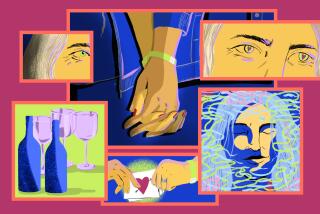Still Married to That Gold Ring
- Share via
Now that the dust has cleared from decades of feminist revolution, women are free to choose any personal path in life that suits them. Right?
Right--as long as it involves getting married.
“It doesn’t matter what I do about my career, how I develop as a person, what I’ve achieved, nothing you do matters unless you’re married and have a family,” says filmmaker Donna Lustig. “And if you’re not, something is wrong with you.”
Lustig, 34, is not. And she has made merry with families’ discomfort about their daughters’ single state in her debut feature, “Wedding Bell Blues.” The independent film, which opened June 13, stars Paulina Porizkova, Julie Warner and Illeana Douglas with a cameo appearance by Debbie Reynolds.
“I laugh about it, and I made a comedy about it, but it’s really a painful issue,” Lustig says.
Lustig’s Israeli family began applying heat when she was in her teens. By the time she was 29, “the pressure was ridiculous.” She decided to quell the storm by running off to Las Vegas, marrying someone and then divorcing him. A pushing-40 male friend whose own parents were flipping out agreed to the mock marriage provided he was able to retain his virtue. Lustig fell in love with someone else before she could do the deed, although she didn’t marry him either.
In “Wedding Bell Blues,” Porizkova, Douglas and Warner set out on the Las Vegas trip Lustig never made to get their parents off their back after Douglas is peppered with the usual at someone else’s wedding: “I can’t wait to dance at your wedding. . . . You’d better hurry up, your parents need grandchildren. . . . You just shouldn’t be so picky.”
Despite the many changes in women’s lives since the bra-burning ‘70s, one truism remains: For many, singlehood is considered unseemly. In the April issue of Glamour magazine, 80% of readers surveyed said they felt they were victims of bias because they were single. And 72% said that while it’s acceptable for women to stay single longer, they eventually feel pressure to get married.
“My friends are always trying to fix me up with men,” wrote one reader. “They think I must be desperate to find a husband because I’m 34 and still single.”
“It’s romantic for a man to be a bachelor, even into his 40s,” wrote another. “But a woman in that position is considered pathetic.”
*
Such retro attitudes are still well ensconced in ‘90s America.
“It’s still very prevalent, and it’s prevalent across ethnic groups, cultural groups,” says Stuart Fischoff, professor of psychology at Cal State Los Angeles. “It stems from the belief that a woman needs a man to be legitimated, and that it’s a rite of passage.”
Sometimes younger women are at the mercy of colliding generations, nudged by the expectations of elders who came of age in a more traditional landscape. Annette Goliti Gutierrez, who wrote “Wedding Bell Blues,” says the worst pressure came from her grandmother, who had married at 18.
“Finally I got so angry, I said, ‘I’m not coming here again. Every time I do you make me feel bad I can’t get a guy,’ ” says Gutierrez, 36, who later married. “She was from Russia and she wanted to be a doctor. That was unheard of and she resented that. I think she wished she had an education.”
“Betsy,” 33, says she is particularly discomfited by the wedding ritual of throwing the bouquet.
“You put all these women up on display for the audience to pity and then you throw flowers at them, and they’re supposed to desperately grasp for some good luck, which is ridiculous. It doesn’t help you get married. And we do it in the name of fun and entertainment. It’s only fun for the people watching at the expense of those being put on display.”
But even the touchiest of single women acknowledge that pushy parents are annoying them with only the best intentions.
“Parents want you to be secure,” Lustig says. “They want to know there’s someone who will take care of you. It’s all coming from a good place. But you can’t live other people’s lives.
“Obviously it’s not only them. I think about [getting married] as well. The sad part is they want it, and I want it. But the difference is, I want to find the right person at the right time and in the right way and not out of pressure.”
Pepper Schwartz, professor of sociology at the University of Washington and author of “Love Between Equals: How Peer Marriage Really Works” (Free Press, 1995), says women would do well to follow Lustig’s example.
“They have to set some boundaries and give some decent emotional feedback,” Schwartz says. “Be pleasant and open. Understand it’s mother behavior and she can’t help it. You can be good-humored about it and tease back, or if some people don’t lay off, you have to be angry.”
If all else fails, daughters can always remind parents about other changes that have reshaped the nuclear family since their own blissful unions.
“You’d think parents would be nervous about pushing a marriage agenda given the divorce rate,” Schwartz says. “But everyone thinks it won’t be their kid.”
More to Read
Only good movies
Get the Indie Focus newsletter, Mark Olsen's weekly guide to the world of cinema.
You may occasionally receive promotional content from the Los Angeles Times.










